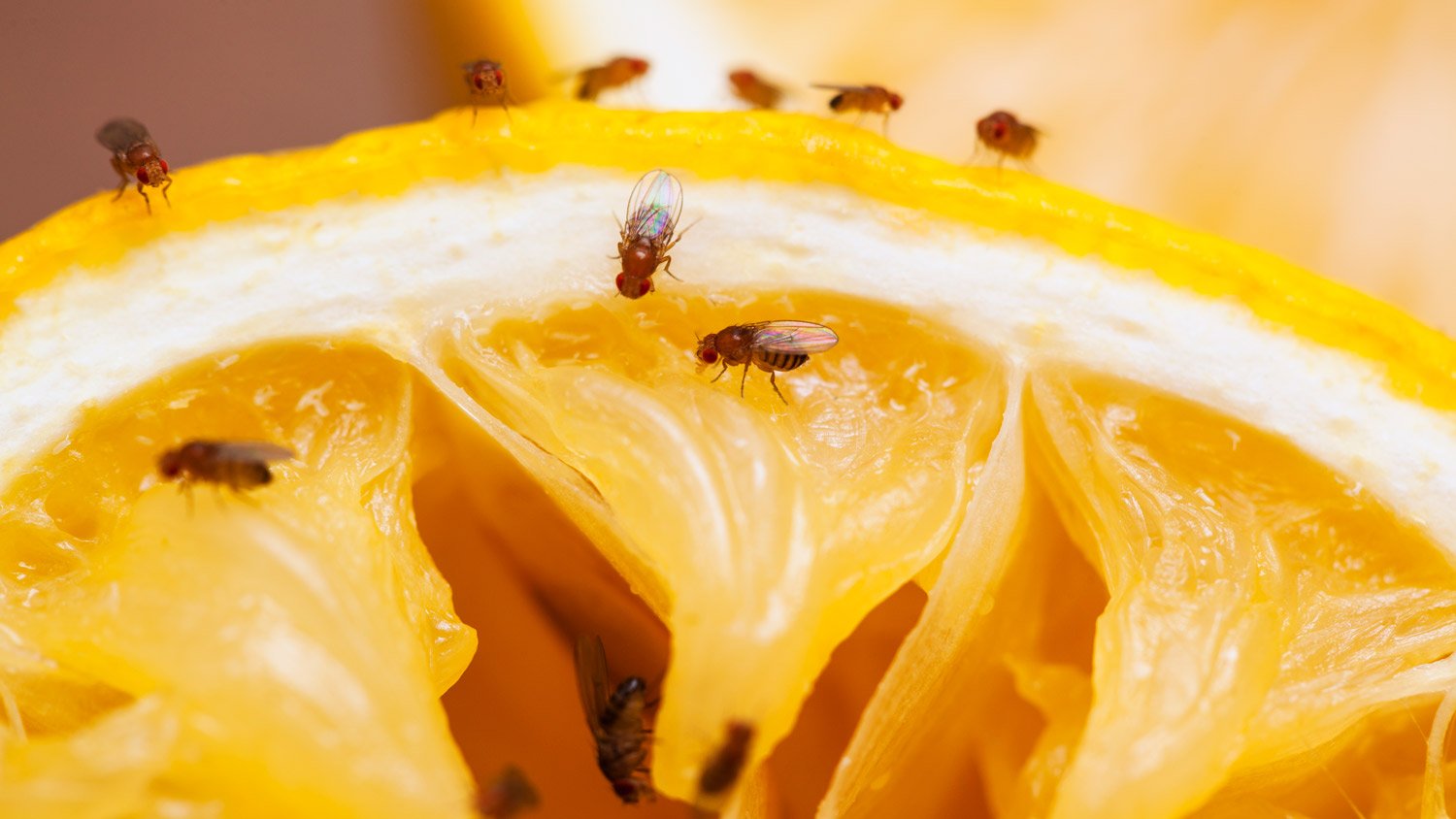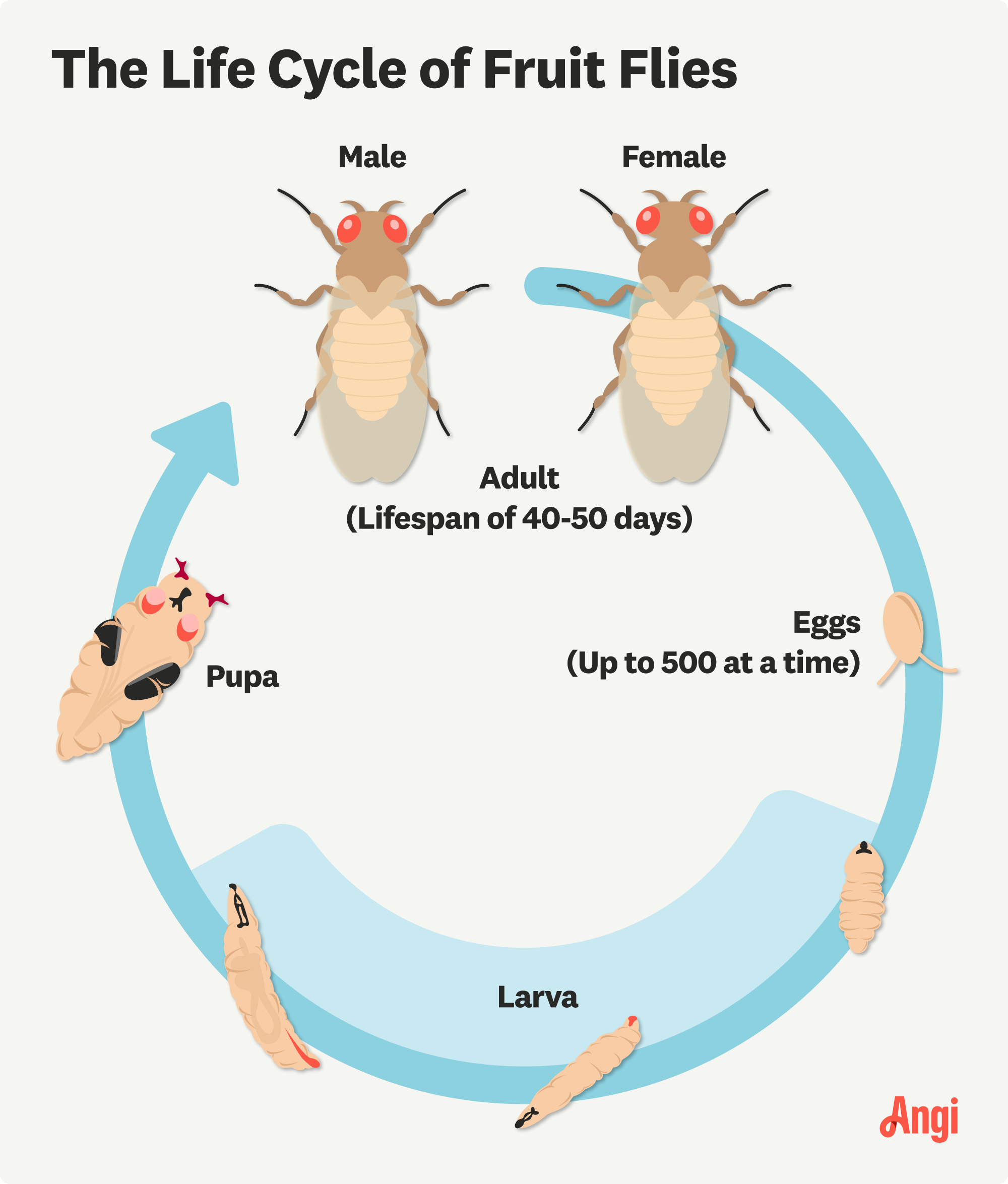
Whether you have bugs, bats, or rodents invading your home, you’ll want to contact an exterminator quickly. Find out how much pest control costs in Columbus, OH.
From egg to annoying insect, find out the fruit fly lifespan


The average fruit fly lifespan is 40 to 50 days.
Fruit flies are attracted to overripe produce and sweet, fermented liquids.
Factors influencing lifespan include temperature and the availability of food sources.
Fruit flies often seem to come out of nowhere, and by time you’ve noticed, there’s already a swarm of them. But how long do fruit flies live? It’s crucial to understand the lifespan of a fruit fly to stop an infestation’s ever-multiplying breeding cycle. We’ll cover the lifespan of fruit flies, what factors affect it, and how to prevent the annoying insects from popping up again.
Under ideal temperature conditions, adult fruit flies live for 40 to 50 days. During their life cycle, female fruit flies can mate and produce multiple batches of eggs, which enables the population to increase rapidly. So, regardless of how long fruit flies live, future generations will continue to grow and breed as long as there’s a food source.
If you’re having trouble with the annoying winged insects, contacting a local bug exterminator is your best bet. These pros can pinpoint breeding ground you might not see and apply specialized treatments to help you get rid of them for good.
True to its name, the fruit fly’s favorite food is overripe fruits and vegetables, as these foods provide an ideal environment for reproduction. Fruit flies also have an affinity for fermented liquids like beer, wine, and vinegar. The yeast and fungi responsible for the overripening of produce like tomatoes and bananas are especially enticing to fruit flies.
Fruit flies are often mistaken for a variety of other tiny winged insects, but they’re easy to distinguish by their red eyes, round shape, and tendency to swarm overripe produce and fermented organic materials.
Many people confuse fungus gnats vs. fruit flies in particular, but the key differences are their body shape and their environment. If you’re noticing tiny winged insects near your plants, these are fungus gnats, while insects near your overripe produce are fruit flies.

The life cycle of fruit flies starts when a female deposits her eggs on fermenting fruits or other decaying sweet organic materials. They can lay as many as 500 eggs, which can make it incredibly difficult to slow an infestation. Once the eggs hatch into small, white larvae, they feed on their surroundings for about four days, gaining the necessary nutrients and energy to develop into adults.
After this feeding stage, the larvae seek out dark, dry areas to pupate. During this phase, the legless larvae develop six legs and a pair of wings before emerging as adults. The entire process takes roughly four days. Once pupation is complete, adult fruit flies are typically ready to mate within about two days.

Unfortunately, answering “how long do fruit flies live?” won’t determine how long an infestation lasts. While the fruit flies only live for 40 to 50 days, they will continue breeding as long as conditions are ideal. Removing breeding grounds and practicing regular cleaning are essential steps in shortening the duration of an infestation. Temperature also plays a significant role in the lifespan of fruit flies: Warmer temperatures accelerate development and can prolong lifespans, while cooler temperatures may slow down larval and pupal stages and can lead to higher adult mortality rates.
Fruit flies can seem impossible to get rid of, but there are a few things you can do to prevent future infestations:
Check both new and old produce for overripe areas that could attract flies.
Inspect produce for fruit flies before you purchase it and bring it into your home.
Discard empty produce boxes that might contain hidden fruit fly eggs.
Clean up sweet or fermented liquid spills immediately.
Eat your fresh produce before it ripens or starts to decay.
Regularly clean and sanitize to kill the eggs of fruit flies in your garbage can, garbage disposals, and sinks.
Avoid tossing produce scraps in indoor garbage cans, or empty them frequently.
From average costs to expert advice, get all the answers you need to get your job done.

Whether you have bugs, bats, or rodents invading your home, you’ll want to contact an exterminator quickly. Find out how much pest control costs in Columbus, OH.

Your mosquito misting system cost will vary based on factors such as the size, type, brand, and more. Find out what the budget for this system looks like.

Moth infestations can cause damage to items in your home. Learn how much moth extermination costs and ways to save in this informative guide.

Foxes are opportunistic scavengers, so you don’t want to give them an excuse to park on your property. Learn how to keep foxes away from your yard.

Discover methods for how to get rid of rabbits using humane tactics, including fences, repellents, and a decoy garden. Get ready to send those bunnies hopping.

Learn how to bomb your house for roaches safely using store-bought foggers for DIY house fumigation.